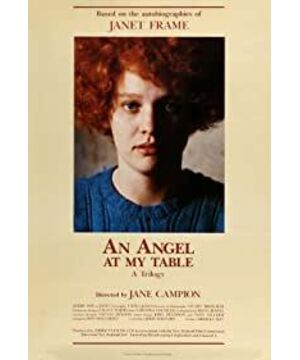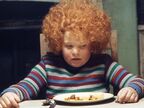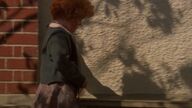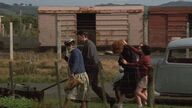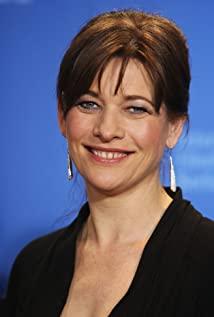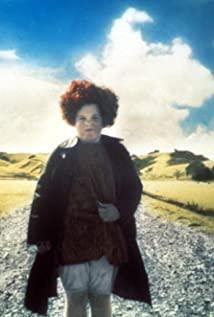Last year, Italian director Aliche Rohrwacher, who became a hit with "Lazzaro the Happy", selected a New Zealand film in her CC Standard Collection TOP 10 list - "Angels at the Table with Me". Aliche said the film made you feel like you were "participating in the storytelling" and the joy it brought was "like being in the water and letting the waves flow". Coincidentally, Grandma Varda also selected this work when she was looking for discs in CC the year before .
Released in 1990, "Angel at the Table with Me" is the work of New Zealand female director Jane Campion, which won the Grand Jury Prize at the 47th Venice Film Festival. Campion's most famous work should be "Piano Lesson", which won the Palme d'Or at Cannes in 1993 (she is still the only woman in Cannes history to win this award), as for those who still remember "Angels at the Table with Me" Not much.
"Angel at the Table with Me" tells the story of the first half of New Zealand's famous female writer Janet Frame (Janet Frame, 1924-2004) adaptation. Not only is Janet the author of many novels and poems, her exceptional resume includes admission to a mental institution as a youth, and even living there voluntarily, for eight years. Similar to "Flying Over the Cuckoo's Nest" or "Prisoner", it is foreseeable that this film will bring you depression; but the difference is that the protagonist of this film is a poor-looking, sensitive and shy, immersed in words. woman of the world. What happened to this "mad woman"? Who is "angel" referring to?
Following the figure in the video may have the answer. This time, Little Trick has produced new subtitles for "Angels at the Table with Me", which can be obtained at the end of the article; we also translated the introduction of the autobiographical collection of the original film "Angels at the Same Table with Me", which was written by director Jane Campion. . The article describes the origin of the director's filming of the film, as well as his meeting with the writer himself.
Janet Frame's first novel, Owls Do Cry , became a sensation in New Zealand when it was published. Some hailed it as the country's long-awaited first great "masterpiece," while others hated the book's italicized inner monologue and criticized it for being too trendy and "too melancholic." But for me, when I read it at 14—the same age as the character Daphne in the novel, the Daphne in the House of Death, her dark, meaningful singing captured my heart.
It was early in the day, and at first the birds came, and the wren chirping in the clouds, singing like a child in a poem, put down your bagpipes, your happy bagpipes. [1] There are bean pod flowers and green verdant grass growing here, and there are swarms of flying insects, swaying and hitting the high ground.
This is Janet's inner world sketched for Daphne, a treasure full of imagination. Not only that, but Janet confirms such a world in my heart, and maybe even in the hearts of all sensitive teenage girls. We are given a voice: she is poetic, powerful and destined, she is a beautiful and mysterious song of the soul.
When I read this book at 14, my life was torture. I still remember sitting on my bed, leaning against the white plastic headboard, the hazy white gauze bedspread, and the rose-patterned curtains spread out in front of me. My room didn't have any of the romance I'd dreamed of, the bedspreads and curtains that I imagined were suspended over the green carpet like a forest mist. The bedspreads and curtains were instead a radiator fire, a humiliation and a testament to the failure of my efforts to romanticize them. But where I couldn't succeed in creating the atmosphere, Janet did a great job, and I couldn't be happier.
"Owls Really Cry" is experimental, and is based in part on Janet's own experiences, including her eight years of on and off psychiatric sanitariums. This sparked a lot of rumors and negative impressions about her real life. Some believe she is still in a nursing home, possibly having a prefrontal lobectomy, and is seen as a tragic genius devastated by psychosis. Others speculated that she had changed her name and moved overseas.
My family spends most weekends in our waterfront apartment in Primorton, driving through the notorious asylum, the Poriruwa Hospital, on the way there.
"Is Janet Frame in Porirouis?" I ask as I stare at these dead prison-like houses surrounded by grotesque giant cypresses.
"No, not Poriluis."
"Where is that?"
"She's in Sunnyside."
"Sun Eun Kwang? They call the mental hospital 'Eun Kwang'? Is she still there?"
I looked and thought.
I look at her life with admiration, pity, and fear. Being unusual is a stigma in New Zealand society, and being "crazy" is an irreparable stigma.
After 15 years, I unfortunately have to frequent the K2 ward of the Poriruwa Hospital. Because my mother went there many times for a little relief from the fear and hopelessness that she could not overcome with depression in her later years. And just like that, I set foot on Janet Frame's territory—stepping over Marx's prosthetic leg in the hallway, and pushing away an old man who was walking towards my mother, and in the lounge he took him with him. With a startling attempt, he put his hand on her armrest and asked, "Edith, how much would it cost if I wanted to sleep in your room?"
Mother said without worry, "Mike, I told you I wouldn't talk to you about money."
In 1963, Janet Frame returned to New Zealand, and in part to avoid the gossip that haunted her life, she decided to write the truth. That's why she wrote a three-volume autobiography, which she collected in a volume titled "Angels at My Desk." This is one of the most beautifully sounded, one of the most moving books I've ever read, and one of the best works by a New Zealand author.
She did the hardest thing in writing, she found a very natural voice, like these weren't written down, they were always there. She didn't hesitate; "Janet Frame" was born, and we grew up with her. Janet does much more than clarify misjudgments about her personal experience: she tells her entire life, which is as unexpectedly fascinating as it is tragic. Other than the years in and out of mental hospitals, I didn't know that her two sisters tragically drowned in accidents that were never mentioned, nor did I realize that novelist Frank Sargeson Played the role of savior in her life, providing her shelter and teaching her to write for a living. The pleasures in the third volume that followed were about her love story, one in Ibiza and the other with a Spanish man in two-toned shoes.
Perhaps Janet's unique talents, and the qualities that make her masterpiece, lie in her profundity and candor by exposing her vulnerability; Write about your own success. She made me defenseless. No one has asked me to praise Janet, but I still know her every bit and love her.
In 1982, my mother sent the first volume of Frame's autobiography to me in Sydney, where I was studying film at the Australian Radio, Television and Film School. The book has just been published and is not yet available in Australia. 14 years after I first opened Owls Really Cry, I'm sitting on my bed again, reading Janet Frame once again, this time with the autobiography "Angels at My Table" 's first volume. This time, I no longer have any attempts at the mood of the bedroom. My mattress was just on a board supported by four milk corrugated cartons, and there were no headboards or bedspreads.
I remember these details so clearly because Janet's book had a huge impact on me. I kept sobbing as I read. Like she punched me hard in the chest. But it wasn’t just Janet’s life that struck me. Reading I also relived my childhood: exploring fault canyons, playing longtime Trailblazers in a caravan made of vegetable boxes, Katherine Mann on the street corner Playing circles at Sfield Memorial Park, and the shame of being dumped by Jeffrey Baird at the Queen Margaret's College ball - in his words, well deserved for dumping him three weeks ago.
That weekend in Sydney, I lay in bed with an idea: to share this unique experience with as many people as possible. I didn't think I was going to help the book, just thought the TV series might be helpful in sharing her work more widely. So, later that year, I set off to find Janet Frame.
On December 24, 1982, I met her. Back in New Zealand for Christmas, I drove my mother to Levine and asked Janet about the copyright of her autobiography. I was 28 at the time, and my godmother, Margaret Gordon, knew Janet, and she gave me the address and arranged this meeting.
Levin is a bland, simple and uncluttered town, where every brick or log house is the same size and style. From these houses, Janet's home is easily recognizable by the unmowed golden grass in the front yard and the extra layer of brick walls placed outside the house for sound insulation. The house looked empty and deserted. I almost jumped when Janet answered the door. We are all nervous. I had brought her some fresh eggs, but smashed them while braking hard on a corner. I tried to explain to her that I almost had an accident, but before I could finish, Janet got anxious.
"Accident? Oh dear, are you all right?"
"No, it's not me, it's the egg."
I went deeper and deeper.
"What eggs?"
(Because there were no eggs; they were all broken.)
Eventually we stopped talking about cars and eggs and accidents, and I told her how much I liked "To the Island"[2].
Janet is unlike anyone I've ever met; she's free, more alive, and alive. She is witty and thoughtful at the same time. Janet's demeanor is unconventional, and she doesn't care about how she dresses or looks.
I still remember her house was a bit messy, dishes were scattered in the kitchen, and there was no door in the bathroom, only a curtain instead. She also has a nice white Persian cat that we all absolutely love. Afterwards, she walked me through the house and showed me where she was working. She attributes every room, and even every part of the room, to a book in the works. The rooms are separated by hanging curtains, like those used in hospital wards for doctor rounds or for patient privacy. This may have been influenced by the difficult times in and out of mental institutions in the 20s. On the desk where she will eventually write, there is a pair of earmuffs.
"I can't stand any noise," she explained. "Two walls are useless, so I'll have to move."
After we sat down I looked at my watch because I had been warned not to stay here for more than an hour.
Janet kindly and honestly suggested that I wait until I finish reading the last two volumes of my autobiography, which are expected to be published in 1983 and 1984, to see if I like them as much as To the Island. Until then, she will not sell the copyright of the book to others. She said she likes to be bold, which fills me with hope, even though I'm still a student. Janet, who has a much more sophisticated taste in movies than I do, discussed "Last Year at Marienbad" with me and said she especially liked the intense atmosphere of the film.
Suddenly there was a thunderbolt outside, and we heard what sounded like a rifle nearby.
"Looks like the Christmas elves are coming early," Janet said.
We laughed as we heard more shots.
"Do you have any special plans for Christmas?" I asked.
"Sure, I'm going to spend Christmas with some very good old friends," she replied as we walked to the front door. "I'm going to spend the holidays with the Brontë sisters, Emily and Charlotte."
I visited her again two years later, this time with my friend and producer Bridget Ikin. We had tea with Janet in what she called the dining room, but there were no tables, just a bed with a pink corduroy comforter. Janet and we sat in chairs on either side of the bed, all three carefully placing their teacups on their laps. The atmosphere was very pleasant at the time. After a while, I felt like the three of us were going to the hospital to visit someone, but the patient was not there. It seemed that we were too polite to say it, or we were all Dadaists and deliberately didn’t go. Mention this.
The last time I saw Janet was when we were filming together. Two producers, John Maynard and Eakin, invited her to visit our crew in Oakland. So Janet came from Levin with my godmother, Margaret, who also makes an appearance in the film.
On the set, Janet found a chair facing the studio and sat down, she watched us shoot, watched me, and I watched her, and I really appreciate her caring and giving me the opportunity to do my best. She didn't want to be in control, not only then, but during the long process of adapting to Laura Jones's script afterwards, she hardly ever pointed the finger or asked for changes. Over the course of the week, Janet sat closer and closer until Friday, her last day on set, when she sat on a couch that had been film props for the Frames in Oamaru. She was holding a pink-page notice sheet with movie-world jargon all new to her: "finish," "announcement," "live props," and "load cassette"—she pronounced slowly Spoken and read them out, as if savoring these novelties.
Janet's week here is precious to all of us and Maynard commemorates the time with a photo of 4 Janet's, Childhood Janet, Teen Janet, Kelly Janet, played by Kerry Fox, and Janet herself.
I often wonder why people like my movie "Angels at the Table with Me". When the film was at the Venice Film Festival, I felt a reaction that I have never had before or since. At the time of the screening, I had no idea how this long film was accepted. A tall, elegant Italian woman sat beside me, her complexion tanned like fried bacon, in high-heeled sandals and a slender evening gown. She doesn't conjure up images of some unkempt, red-haired, grey-faced New Zealander. I sat up straight for fear of seeing her yawning beside me. Towards the end of the movie, she grabbed my hand and whispered in Italian, "Poor, so pitiful."[3] I thought to myself, "Is this film so hopeless?" See her burst into tears. She was very eager to know if Janet's ending was okay. Then when the creator came on stage, this elegant stranger hugged me, and I was dipped in her tears as I was kissed on the cheek. "Amazing! It's beautiful!" she almost shouted.
It wasn't the best movie of the class, but it was the most beloved. When Angel was awarded the second Silver Lion, the jury president was prevented from announcing the Golden Lion winner. 5 minutes passed, 10 minutes passed, and people chanted: "Angel! Angel! Angel! …"
The only New Zealander present other than myself to witness the success of the film was a sales agent from the New Zealand Film Commission. He had earlier confirmed to me not to call the hotel room service because of the extra high cost. He also told me not to fantasize about our Italian dealer Roberto Cicutto flirting with me because he's gay. Despite this, he is also the savior of the film. He made the TV series finally become a film and made the film debut at the film festival for the first time.
I haven't seen Janet Frame since "Angel". Our lives did not intersect, but my understanding of Janet, her talents, and her dedication to literature still affects me. I used to think she was lonely, but now I don't see her that way, she just lives in a special, near-sacred realm away from the worldly needs and habits of her husband, children, and narrow social circles.
In 2003, in the last days of Janet's life, she had been diagnosed with acute leukemia and faced death. I read in a story that she said her own death was an adventure, "and I always enjoy adventure". An adventurous little Nini, a wormy and capable red-haired girl. For a poetic soul, there is no better disguise than this.
I regret not writing to her before she passed away, when she would still receive condolences and thank you letters, some addressed only to "Janet Frame, New Zealand". This introduction is my tribute to Janet forever, Janet forever, you have become a myth, notoriously shy, but still sharing your life with anyone who reads this book.
Jane Campion 2007[4]
Notes
[1] This paragraph is the song sung by Daphne in the novel. The phrase "Drop thy pipe / thy happy pipe" comes from William Blake's poem "Innocent Songs" Overture ( Introduction to the Songs of Innocence ), composed by a man in the clouds children sing.
[2] Janet Frame's three autobiographies are To the Island , An Angel at My Table and The Envoy from the Mirror City. Mirror City ). There are also Taiwanese translations translated as "Angel of Island Country", "Angel at Desk" and "Angel of Magic Mirror". Therefore, the subtitle of the film is the trilogy, and the chapter names correspond to the titles of the three volumes.
[3] The original text is Italian "Poverina, poverina", that is, poor thing. The director thought he was saying that the movie was terrible, but he was actually referring to the poor protagonist.
[4] The above is translated from the introduction in An Angel at My Table: The Complete Autobiography by Virago Press , written by Jane Campion in 2007. The original text has no title, the title of this article is taken from another version of the article published by The Guardian in 2008, titled " In search of Janet Frame ".
About the new subtitles
The quality of the original OCR Chinese characters in this film is worrying, and it has been revised in 2016. Because "Angel" not only has a strong connection with Janet's autobiographical text, but also a large number of famous poems in English literature, including Shakespeare, Shelley, Tennyson, Yeats, Auden and so on. Therefore, Little Trick once again revised the subtitles of "Angel" and corrected the previous mistakes. Most of the translations of the poems refer to the famous translations, and add annotations and a small amount of special effects.
There are 7 members of the Janet family. There are many people, and some have nicknames. In order to avoid confusion, the little trick has attached a brief introduction to the Janet family in the public account. The sources of the poems and translations that appeared in the film are also attached.
Get subtitles:
Please poke - a little trick to surf the public account
Other Channels - Sub HD & Pseudo Shooter
——First published on the public account Little trick to surf——
View more about An Angel at My Table reviews


